There’s a lot of misinformation about how “medical grade”, “clinical” or “professional” skincare products are guaranteed to be better than drugstore or “over-the-counter” (OTC) products you can buy at the supermarket.
Like a lot of other myths, this myth has mostly been promoted by some well-intentioned people who have unfortunately been fed the wrong information by brands who know better (or should know better, if they’re not being negligent).
But there are also a lot of people (mostly estheticians based in the US, it seems) who use this myth to bully and belittle other people: for “ruining their skin” by using non-medical-grade products in their routines, or for being stupid enough to believe that non-medical-grade products can achieve results, or for not having the means to pay for more expensive products.
This is shitty behaviour even if it was the truth, but since it’s a myth, it’s even worse. While this myth might not be as directly harmful as, say, myths about sunscreen being dangerous, it’s definitely a myth that leads to harm. So let’s bust it.
Why do people claim that “medical-grade skincare” is better?
(Note: We’re talking about products you buy and use at home, not peels etc. that can only be used in certain clinics.)
Here’s the video on YouTube, scroll down for the text version…
“The FDA regulates medical-grade skincare differently”
A lot of the confusion comes from the frequently-promoted idea that there’s an official difference between how medical-grade skincare and “over-the-counter” (meaning drugstore) skincare are approved by the FDA, or other government regulatory authorities. This isn’t the case.
In the US, the vast majority of skincare products fall into the cosmetic category, which means they don’t require regulatory approval or proof of efficacy (outside of not containing banned ingredients, or restrictions on ingredient concentrations) whether they’re medical-grade or not. This is also the case in most places around the world.
The confusion partly comes from the fact that “over-the-counter” is a term used in drug regulation to describe drugs that can be bought without a prescription, like sunscreen, aspirin, cough medicine and antihistamines. In contrast, prescription medications require a prescription from an appropriately authorised health professional, like a doctor or nurse practitioner. Both over-the-counter drugs and prescription drugs are regulated by authorities like the FDA or TGA.
There are a few skincare products that are usually regulated as drugs. For example, there are prescription-only tretinoin and tazarotene creams, and over-the-counter sunscreen, benzoyl peroxide, sulfur, salicylic acid and adapalene products. Ironically, these are usually found in drugstores rather than in “medical-grade” ranges.
Related post: My Routine for Starting on Tretinoin (Retin-A) Cream
For drugs, depending on the actives and the claim, testing methods differ – some products aren’t tested for efficacy (e.g. benzoyl peroxide products just need to contain a certain percentage). Products that are regulated as drugs will be clearly labelled. For example, in the US, there will be a “Drug Facts” label, and in Australia there will be an AUST R or AUST L number and active ingredient concentrations on the front. In some countries (Japan, Korea), cosmeceuticals and quasi-drugs are regulated in addition to drugs, but again these will be clearly labelled.
So… “medical-grade” skincare IS “over-the-counter” skincare, since it isn’t prescription-only.
“There’s rigorous testing/clinical studies/research so it does what it says” “They use higher quality ingredients”
Because “medical-grade”, “professional” and “clinical” aren’t regulated terms, there’s no guarantee of any sort of testing.
Some medical-grade brands will do rigorous testing and clinical studies, but anyone can use the term “medical grade” and decide to only sell their products through skin clinics.
Many drugstore products will have rigorous testing and clinical studies too. Some of the ones regulated as drugs, like sunscreen, will have mandatory clinical trials. Many of the more dermatologist-friendly brands targeted at sensitive skin, like QV or Bioderma, will also have conducted clinical trials on their products.
“They contain higher percentages of actives” “They’re allowed to penetrate deeper than over the counter and drugstore products”
Unless they’re drugs, again there isn’t any regulatory difference. You can get the highest percentages of actives with brands like Paula’s Choice, The Ordinary, Drunk Elephant etc.
Medical-grade skincare is just like any other type of skincare. Whether they’re good, or effective, or worth the price, or have clinical studies to back up their effects has to be judged on a brand-by-brand or product-by-product basis.
Final Note
When I posted about this myth on Instagram, I had a bunch of estheticians tell me my opinion wasn’t worth shit and block me. I did also have lots of estheticians who thanked me, along with a few medical-grade brand educators, so no, it’s not attacking medical-grade brands or estheticians… just those who knowingly perpetuate this myth and use it to harass others.
So here are some reasons why perpetuating this myth is NOT a good idea, if you’re an esthetician:
- If a product is honestly amazing, it doesn’t need to be puffed up with myths about FDA regulation, or how deep they’re allowed to go into the skin, or how toxic drugstore products are, etc. If a product has worked wonders for you and others you know in the past, just say that! If there’s an amazing team of researchers and formulators who made it, if there are great B&A photos to back it up, if it has effective actives that you rarely find in other products – again, just say that.
- Deceptive marketing is unethical and illegal, and you can be reported for it.
- People who discover that they’ve been sold a myth tend not to be repeat customers.
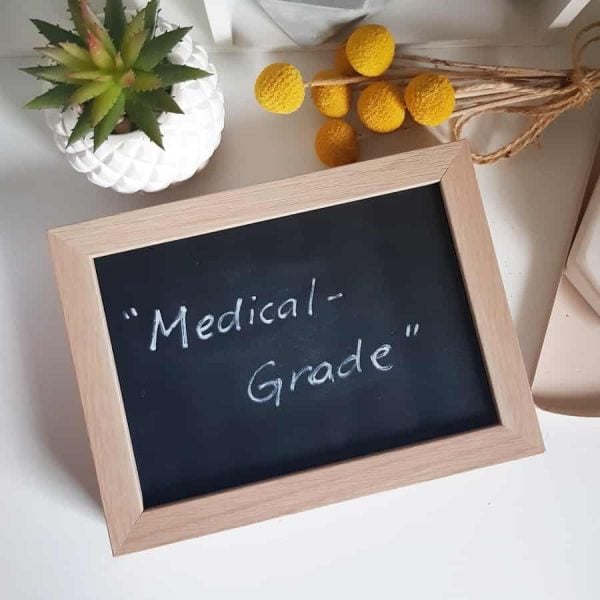


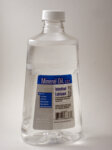
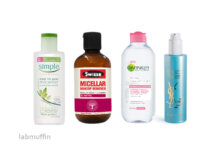
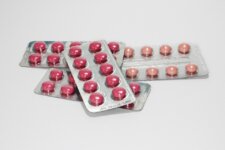
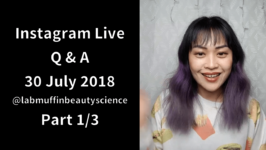
go offff michelle!
Thank you!
Amen. Literature citations are not magical incantations brands can invoke to claim efficacy. Drunk Elephant is currently facing a class action suit about its Shaba Complex Eye Serum’s failure to deliver on claims. You should read the complaint. It alleges deceptive practices citing the oft-used language of US cosmetic brands such as “cell-communicating,” “skin identical,” and “promoting firmness.” Though it will likely go no further than pretrial it certainly puts sciencewashing under the lens of increased legal scrutiny.
This is a much needed blog. Thank you!
I hope to god this post is not sponsored by Drunk Elephant.
I’m not sure why you’re insinuating it is. Do I have a history of not disclosing sponsored posts? Do I have a history of being biased towards Drunk Elephant? Even if it was sponsored by them, is any part of this post inaccurate?
I hope to god your comment isn’t sponsored by internet bullies.
Tell it like it is, Michelle, and thank you for this post. Well done you. Cheers, Ardith
*facepalm* I am so sorry for comments like that, Michelle.
Mentioned among three other brands that are similar. Smh. People comment idiotic things.
@ Turok, your comment makes absolutely no sense.
Michelle is talking about how some brands and their pushers use false logic to promote expensive products (sometimes junk) as “medical-grade” skincare which supposedly is more effective than drugstore brands.
Drunk Elephant would be a beneficiary of bullshit arguments favoring more expensive products; Michelle is saying the exact opposite that cheaper products can be just as good. Why would Drunk Elephant want to sponsor an argument against its own interest?
Brilliant article – I hope you don’t mind but I’ve shared this link in a private facebook skincare group (set up with ‘beautiful with brains) so others can read it.
Thank you so much for sharing it! Don’t mind in the slightest 😀
You are amazing! I SO appreciate your work & that you take the time to share & educate on these things. I have watched you for a long time & you have GREATLY helped me navigate these foggy waters. Stay strong dear one! Again, thank you! ❣️
Very helpful. Thanks so much, Michelle.
Thank you thank you thank you! I’ve been having this conversation with friends for ages and they do not believe me.
im sorry those estheticians attacked you. so not right
This esthetician thanks you! Exactly my thoughts, but unpopular on esthetician forums!
So glad yo keep harping on this issue – thank you!
Love your honesty.
YES!! Thank you Michelle. I love that you’re using this space to call for more integrity. I’ve generally found that the ‘quieter’ and ‘to-the-point’ product descriptions/claims are more trustworthy.
Love your blog and your comments on various products have been an eye opener,coming from a developing country (India) the problem is much worse here.We are systematically fed information about the use of various brands through commercials etc. Often times these are not regulated and lead to harm !
Skin whitening tops the list. there is an absurd obsession here with being whiter !!
Nice one Michelle.
I do find the fact that some creams are regulated differently in different countries confusing, like azelaic acid is sold over the counter in Australia, but is prescription only in the USA. Or conversely, that adapalene is over the counter in the USA, but prescription only in Australia…
Thank you for being so honest and educational! Anyone who who harass you for citing facts just cannot have honest intentions.
Your posts entertain and inform and I learn something new every time! Stay strong and keep up the good work!
Yes!! I see so many Instagram esthetician’s believe medical grade is better and the only way to get results. It is merely just marketing.
I love your no-BS attitude, and thank you for debunking this! Deceptive marketing really gets on my nerve, but I’m not sure if companies can be legally prosecuted for it in the U.S. though. It seems like our regulation is too loose that people can just get away with pretty much anything.
Thank you for this article. Very informative and easy to read for us laypeople. I also appreciate you not letting the internet hate stop you from getting the truth out there. It must be frustrating at times. Thanks again.
Do you have a list somewhere of brands that do good clinical trials? Or can I tell from a brand website?
Thanks for writing this! 🙂 I’m also following you on instagram, where you post about those fake “sciency” things. But you break up those posts in the comments and the part 2, 3, etc are difficult to find when there are a lot of commenters. Can you transform those insta posts into blog posts? Thanks!
I will once they’re all posted! I’m glad you’re enjoying it 🙂
Coincidentally I was just reading this article “Keep consumer hand lotions at home” from the American Nurse Today journal. Hospital grade lotions apparently have the same qualities that are recommended for regular consumer products even though they’re for professionals who are constantly washing their hands. They’re just more stringent about avoiding fragrance and allergens, and have some extra issues like petroleum deteriorating latex gloves.
This is an absolutely brilliant post! Most consumers, and that includes me, do not have the background and facts, and assume that certain claims have specific meanings – which as it turns out, is a wrong assumption. Marketing companies, including big companies and “natural” beauty companies, take advantage of that. I know that I have fallen for these claims. Thank you for this.
I love your courage!! Thank you for being so honest and for sharing this very informative post!
Great article! Thank you so much for educating us about this! Cheers xx
Thanks for giving this useful information. I appreciate your work. You are doing very good. keep sharing because this type of posts helps everyone.
If you compare many “medical grade” products with OTC’s you find that their ingredients are very similar. There’s a reason why “generics” exist in medicine, so I don’t see why a “generic” in skincare is any different, especially when they contain the same ingredients. An OTC sunscreen that has 2% Titanium Oxide in it isn’t much different from a brand name one with the same formulation. All you end up paying for is the brand name and the status. That’s it.
WoWWWWWWW.
I just downloaded your exfoliation free guide. So what do you think about the clarisonic alpha. Inconjunction with exfoliation. Mr newbie. It sucks getting old.
Hi Michelle,
Why is salicylic acid in the drug category but not glycolic acid?
Salicylic acid is derived from the same ingredient used to make aspirin. Ergo, it too is regulated like a drug.
Of course because of this requirement, a lot of indie or clean beauty brands avoid salicylic acid since regulation would be expensive for them. They therefore use willow bark extract instead to avoid the drug regulation and pretend it’s the same thing even though it’s not.
So is there any makeup that is actually good for your skin with great application results as well?
Thanks for this informative blog. It is amazing for skincare products marketing.
Well written keep writing.
Hi Michelle,
Thank you as always for another great article!
I agree that there are a lot of great products not necessarily fund in a medical spa . But I attended a lot of trainings and there are a lot of companies that do sell more concentrated products to medical facilities. The same company’s have a line of products for a regular spa and another line of products ( more concentrated, stronger ingredients) for medical spa. Always read the labels and become an educated consumer so you can make a best decision for yourself.
Could you provide the research that refutes these claims?
These aren’t claims that you need peer-reviewed research to refute. It’s like saying “Cats called Barry are smarter than all other cats,” then when someone calls you out on that, you ask them to provide research to refute your claim.
Hi Michelle!
I recently read your exfoliation guide and have since bought (yet to begin) your e-book! As an esthetician I have heard both sides on the topic of “medical-grade” skin care. I understand this isn’t a regulated term. Could you clarify what you know further on the term “pharmaceutical grade”? Is this an FDA regulated term? I know of a skin care line that uses an FDA approved medical lab to produce their products. The claim is that pharmaceutical grade (not speaking distribution channel) has to be 99.9% pure, where cosmetic grade has to be only 70% pure. Pharmaceutical grade is required to provide testing up to 10 years, where cosmetic grade isn’t required to provide FDA testing. The last main point to this claim is that pharmaceutical grade is required to provide testing for all efficacy claims, and cosmetic grade is not required to provide efficacy claims. The company who’s claims I’m referring to resides in the US. Any information you could help me to understand further on this would be greatly appreciated!
Great read. Thanks for all the work you put in!
very interesting and easy to read blog, I really appreciate your courage and your honesty … congratulations
Thanks so much for this great article! I had my first aesthetician experience today as I got a PDL treatment for some capillaries around the nose, and during the consultation the tech went off about how my drugstore skincare routine – which has basically healed my hormonal breakouts – can’t possibly be any good for me and that there’s no active ingredients in it, and medical grade skincare was the only answer… and wouldn’t stop peddling this nonsense for the entire appointment. It was a deeply frustrating experience and she certainly lost a repeat customer right then and there 😀
I was re-reading this and read the link your provided. From what I saw from the FDA, the terms aren’t recognized but a cosmetic vs. a drug is based on intent. And their example was essential oils: fragrance=cosmetic, aromatherapy= drug.
Huge! I visited a skin clinic last week (in Melbourne) that tried to sell me into their “cosmedical” products even after I’d told my esthetician that I was really happy with my skincare products and routine. She tried to sell me nearly identical products to things I already use and noted in my client form – saying that these “cosmedics” are of a different grade to drugstore items. Never going there again.
Hi Michelle,
Great work as always. Thank you.
Please consider a study/post on surgical scar prevention/mitigation. I am having my thyroid removed along with a partial masectomy. You might think scarring is the least of my worries, but it helps to have something else to think about. Any recommendations on collagen sheets vs products like Mederma? Or old wives tales about onion skin?
Keep fighting the good fight.
Cheers,
Thank you for helping people to understand how they are misled. I also admired you recently, doing the same with your exposé on Clean Beauty.
As an esthetician I completely agree with you! I recently was scrutinized by other estheticians about recommending “over the counter” products saying I should know better as an esthetician *eyeroll* this is exactly why I left the industry to begin with… I hated the better than attitude and how it’s an Industry for only “the rich and privileged” not everyone can afford or has access to these “medical grade” “professional” products.. does that mean they shouldn’t be given product reccs that do for within their budget?! Not at all.. therefore I’ll continue recommending products based on my knowledge of ingredients etc and not based on the price. All this to say, I am glad someone wrote this article!
Indeed!! Much obliged to you Michelle. I love that you’re utilizing this space to call for greater trustworthiness. I’ve commonly tracked down that the ‘calmer’ and ‘forthright’ item portrayals/claims are more reliable.
To further confuse me, I just found a reasonably priced retinol serum on iherb with good reviews, and upon wondering what percentage of retinol it has, I found this answer on their site:
“Our 2.5% Retinol is cosmetic grade which is the equivalent of .25% medical grade. ” (this is the page I read that on, in the Q’s section:
https://yeouth.com/collections/retinol/products/retinol-2-5-serum-with-hyaluronic-acid-vitamin-e-and-aloe-vera )
Does not only chemistry but math as well somehow work ‘differently’ depending on’ cosmetic vs medical’? Isn’t percentage, well.. a percentage?
Or if you know what they mean by that, please feel free to jump in 🙂
I think they’re trying to say that 2.5% retinol is equivalent to 0.25% tretinoin…